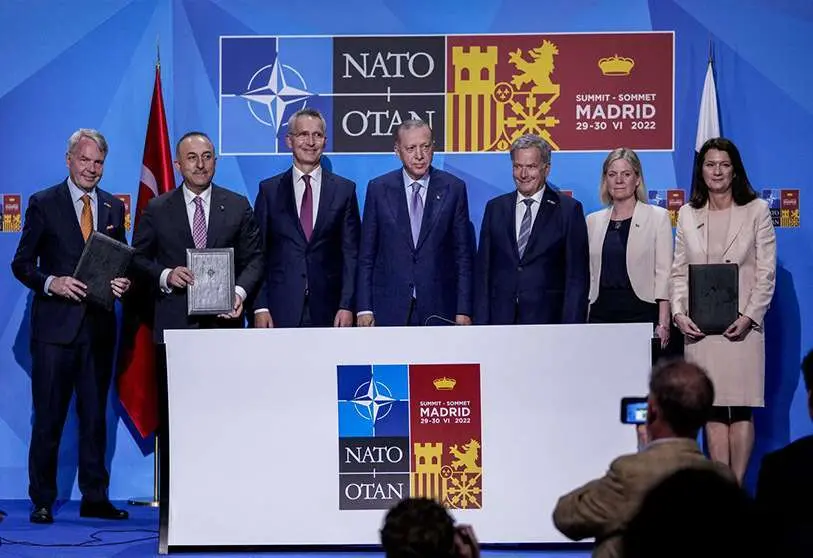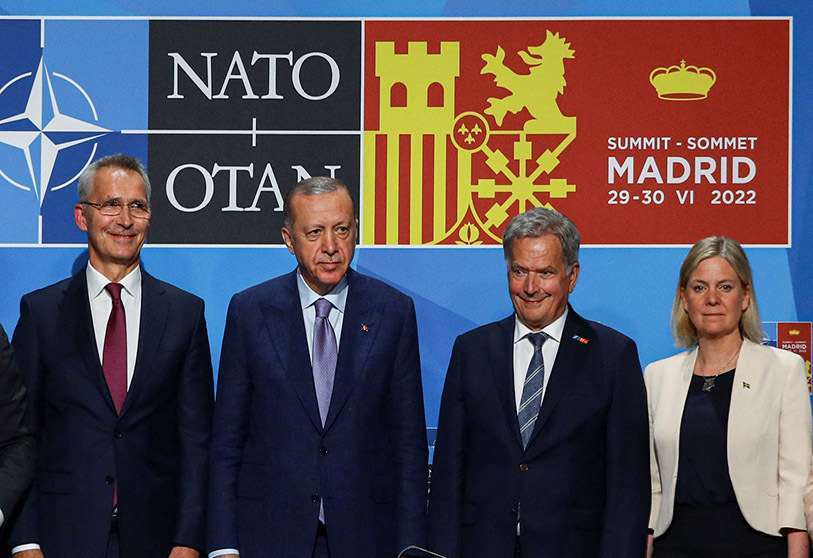Sweden and Finland receive formal invitation to join NATO after Turkish veto is lifted

It took four hours of negotiations between the leaders of Turkey, Sweden and Finland to amplify the historic importance of the NATO Summit in Madrid. The first face-to-face meeting between Erdoğan, Finnish President Sauli Niinistö and Swedish Prime Minister Magdalena Andersson resulted in the lifting of Turkey's veto on the two once-neutral countries' membership of the Atlantic Alliance. Thus begins the countdown to the organisation's enlargement to 32 members.
The mediation of NATO Secretary General Jens Stoltenberg was decisive in bringing positions closer together in an agreement that was reached after 8.30 p.m. The Norwegian politician praised the role of the organisation during the process: "Our officials have been working, there have been meetings in Brussels over the last two days. I have also spoken to President Erdoğan four times on the phone. And also, of course, I have met and discussed this with Prime Minister Andersson and also with President Niinistö in the last few weeks".
Turkish President Recep Tayyip Erdoğan was so far the only NATO leader to oppose Swedish and Finnish membership of the Alliance. Since the Nordic countries submitted membership applications in May, Ankara has blocked the request on the grounds that both states are "promoters of terrorism" for hosting members of the Kurdistan Workers' Party (PKK), the armed group with which Turkey has had a decades-long political and territorial dispute, and followers of cleric Fethullah Gülen, a former Erdoğan ally allegedly involved in the failed 2016 coup d'état.

For new members to join the Atlantic Alliance, the Washington treaty stipulates in practice that there must be unanimity among its members, so Ankara's approval was crucial. Finally, after a month of intense tripartite negotiations under NATO auspices, Erdoğan has given the green light, but not before imposing a number of conditions.
Stockholm and Helsinki have paid the necessary toll to join the Alliance in the face of Russia's threat. The Swedish and Finnish executives on Tuesday agreed to lift the arms embargo on Turkey, to tighten their legislation on terrorism and intensify bilateral defence cooperation, to classify the PKK as a "proscribed terrorist organisation" and, finally, to extradite suspected terrorists belonging to the aforementioned organisations.
Stoltenberg stated that "Finland and Sweden have taken steps to adapt their legislation on terrorism, this is something that has started to be implemented" and that they will work much more closely with Turkey "on issues related to information exchange, extraditions and the general fight against terrorism".
Helsinki refers in the memorandum to "a number of recent amendments to its Penal Code whereby new acts have been criminalised as punishable terrorist offences. The latest amendments entered into force on 1 January 2022, broadening the scope of participation in the activity of a terrorist group. At the same time, public incitement related to terrorist offences was made a separate offence". For its part, Stockholm included in the agreement confirmation that "a new, tougher Terrorism Offences Act will enter into force on 1 July and that the government is preparing a further tightening of anti-terrorism legislation".

Erdoğan expressed his intention to extradite at least 30 suspected PKK members to the Turkish parliament a few weeks ago, but the Finnish president clarified after the memorandum was sealed that no names are included in the agreement. It was Foreign Ministers Pekka Haavisto of Finland and Ann Linde of Sweden who initialled a historic tripartite memorandum with Turkish Foreign Minister Mevlüt Çavuşoğlu.
NATO leaders will extend a formal invitation to Sweden and Finland to begin the process of joining the Alliance on the first day of the Madrid Summit on Wednesday. "After this Summit, Finland and Sweden will become invitees. Then, of course, it will be the ratification process in all the capitals," Stoltenberg said on his arrival at the IFEMA pavilion. The process is more complex and time-consuming.
"No admission process has ever been so fast," said the NATO Secretary General. However, Turkey's 'yes' is the first step; then negotiations will begin "which could be concluded next week, after which the parliaments of the 30 countries will have to approve the accession protocols". The procedure does not seem to be in any danger as there is unanimity.
On paper, Sweden and Finland are not yet under the NATO umbrella, but the NATO Secretary General guaranteed the defence of the Nordic countries within the Alliance for the duration of the accession process. "Finland and Sweden's entry into NATO is important for Finland and Sweden, but it is also important for NATO and in particular for the Baltic countries. Because if you look at the map, you realise that it will change the whole security situation in the Baltic region. With Finland and Sweden, Baltic countries, close to the Baltic, Estonia, Lithuania and Latvia, it will really strengthen our presence in that part of the world, or in Europe," the Norwegian stressed.

Stoltenberg stressed the importance of this new enlargement: "Finland and Sweden bring to NATO advanced and well-equipped forces, fifth-generation aircraft, advanced weapons systems, technology and strong, stable political institutions. So this will strengthen, it will reinforce NATO, and it will also strengthen Finland and Sweden". Moreover, both countries have in the past participated in joint exercises with NATO forces.
Asked about the internal divisions between Turkey and various partners over the issue of the S-400 anti-missile system, the Norwegian said that "there is no way to hide and no reason to hide that this is a difference between allies. But I think today also shows that despite differences, and there will always be differences when we are 30 Allies in the Alliance and now soon to be 32, that we are able to unite around our core task of protecting and defending each other".
"This is a significant Summit with significant changes," Stoltenberg said on the first day. The first change is the start of a new enlargement process two years after the accession of North Macedonia. NATO is being strengthened from 30 to 32 members.








